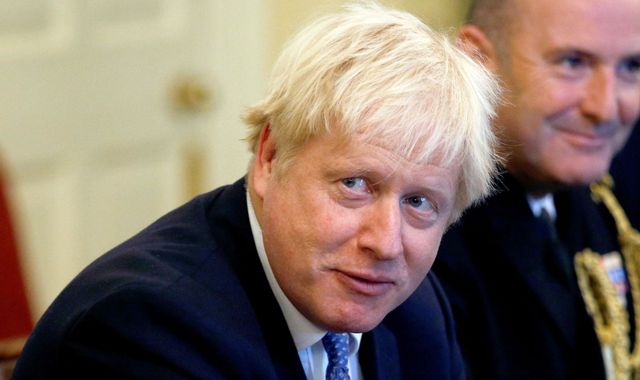Boris Johnson’s reasons for suspension ‘cannot be true’, says John Major
Written by News on 19/09/2019
Boris Johnson has been accused of lying about his reasons for suspending parliament for five weeks – by his predecessor Sir John Major’s lawyer.


The accusation came on the third and final day of the hearings into whether Mr Johnson’s suspension of parliament was legal.
The Supreme Court judges are expected to deliver their verdict early next week, with president Lady Hale saying: “None of this is easy.”
She added: “We will have to decide what the answer is and we will have to decide one way or another what the consequences of that are.”
The PM claimed upon suspending parliament that it was necessary to allow him to introduce a new legislative agenda once MPs returned – but some have accused him of trying to stop MPs holding him to account over Brexit ahead of the 31 October departure date.
Lord Garnier QC, representing former Conservative prime minister Sir John Major, said his client had made “a clear and unambiguous allegation… that the reasons [for suspension] set out… by the prime minister cannot be true”.
He told the justices the reasoning “doesn’t stack up”.
Other developments in court today included:
- Closing statements from Lord Keen, who represents the government, and Gina Miller’s lawyer, Lord Pannick
- Lord Pannick said that if suspension was unlawful, the judges should seek for parliament to be recalled urgently
- Lawyers for Mr Johnson said in a court document that even if his suspension was found to be unlawful, he could do it again
- Mike Fordham, representing the Welsh government, argued Mr Johnson’s government’s lawyers were wrong to say the court cannot get involved in the suspension of parliament
- Ronan Lavery, bringing a case from Northern Ireland, accused the government of trying to force through Brexit
- Mr Lavery was repeatedly warned to focus his arguments on the legality of the suspension of parliament, not the details of Brexit
- James Wolffe, representing the Scottish government, said “parliamentary accountability” was at stake
Tonight at 8.30pm Dermot Murnaghan and guests will discuss the hearings
Tory grandee Sir John was himself accused of proroguing parliament in 1997 in a bid to delay a report into the cash-for-questions scandal until after the upcoming election.
His lawyer, Lord Garnier, echoed arguments made by others during the hearing in questioning why there had been no witness statement from someone in the government to support Mr Johnson’s reasons for the suspension.
He said: “It would be normal for there at least to be some kind of witness statement.”
The final day offered an opportunity for Lord Keen and Lord Pannick to make their last arguments to try to sway the judges.
Lord Pannick, acting for Gina Miller against the government, said the prime minister’s advice to the Queen about suspending parliament was unlawful and that he wanted an outcome that would encourage “the prime minister to ensure that parliament meets as soon as possible next week”.
He urged the judges to deliver their verdict as soon as possible “because time is of the essence”.
Mr Johnson has managed to prevent “any parliamentary scrutiny” by suspending parliament, Lord Pannick said, adding “a number of important bills have been lost”.
He argued the suspension had been for a period “of exceptional length… for no rational reason”.
On the other side of the argument, Lord Keen, representing the government in the Scottish case, said that prorogation was “forbidden territory” for the courts because it is a political matter.
He highlighted that MPs had a chance to bring an election and a vote of no-confidence but they turned the opportunities down.
He also criticised language used by Aidan O’Neill, the QC representing the Scottish case, for his use of language, saying: “[He] used discourteous and indeed incendiary language in describing ministers, advisers and civil servants.”
It was thought to be in response to Mr O’Neill’s comment: “We’ve got here the mother of parliaments being shut down by the father of lies.”
Meanwhile, court documents submitted to the court by Mr Johnson’s lawyers state that Mr Johnson could suspend parliament again even if the Supreme Court rules that the original suspension was unlawful.
They state: “Depending on the court’s reasoning it would still either be open or not open to the PM to consider a further prorogation.”
Earlier in the day, lawyers for the Welsh government and speaking for a Northern Irish case were also heard.
Mike Fordham, representing the Welsh government, argued Mr Johnson’s government’s lawyers were wrong to say the court did not have the powers or responsibility to be involved in the suspension (or not) of parliament.
He said suspending parliament should be done in the public interest – and if this is not the case then the court could intervene.
The Northern Irish case was represented by Ronan Lavery, who is acting for Raymond McCord, whose son was murdered by loyalist paramilitaries in 1997.
Their case argues that a no-deal Brexit would damage the Northern Ireland peace process.
However, Mr Lavery was repeatedly reprimanded by the justices for focusing more on whether Brexit is a good or bad thing and what it will look like, rather than the legality of the suspension.
Mr Lavery accuses the government of using the suspension of parliament to “run down the clock” and to “avoid scrutiny” in order to “pave the way for a no-deal Brexit”.
Baroness Hale, the president of the Supreme Court, told him that the court was “not concerned with when and how and on what terms the United Kingdom leaves the European Union”.
The criticisms came to a head when Lord Wilson said: “Mr Lavery, I am really worried about your submissions. So many people are listening to you. Perhaps some of them have just turned on and they will hear these general points about Brexit and its effect on Northern Ireland and they may come to entirely the wrong conclusion, namely that this is what we are looking at.
“Now, don’t abuse our politeness and don’t abuse Lady Hale’s patience.”
Downing Street said it would wait for the Supreme Court decision before commenting.
(c) Sky News 2019: Boris Johnson’s reasons for suspension ‘cannot be true’, says John Major







